Related Research Articles

Climatology or climate science is the scientific study of climate, scientifically defined as weather conditions averaged over a period of time. This modern field of study is regarded as a branch of the atmospheric sciences and a subfield of physical geography, which is one of the Earth sciences. Climatology now includes aspects of oceanography and biogeochemistry.

The Met Office Hadley Centre for Climate Change — named in honour of George Hadley — is one of the United Kingdom's leading centres for the study of scientific issues associated with climate change. It is part of, and based at the headquarters of the Met Office in Exeter.

The Geophysical Fluid Dynamics Laboratory (GFDL) is a laboratory in the National Oceanic and Atmospheric Administration (NOAA) Office of Oceanic and Atmospheric Research (OAR). The current director is Dr. Venkatachalam Ramaswamy. It is one of seven NOAA Research Laboratories (RLs).

Jonathan Michael Gregory is a climate modeller working on mechanisms of global and large-scale change in climate and sea level on multidecadal and longer timescales at the Met Office and the University of Reading.

This is a list of meteorology topics. The terms relate to meteorology, the interdisciplinary scientific study of the atmosphere that focuses on weather processes and forecasting.
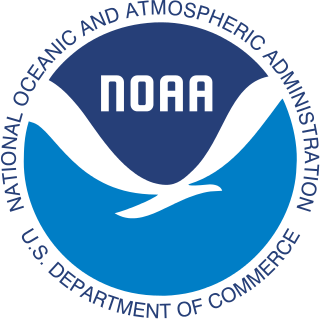
Oceanic and Atmospheric Research (OAR) is a division of the National Oceanic and Atmospheric Administration (NOAA). OAR is also referred to as NOAA Research.
The Arctic Research Office (ARO) a division of the National Oceanic and Atmospheric Administration (NOAA) run under the auspices of the Office of Oceanic and Atmospheric Research (OAR).
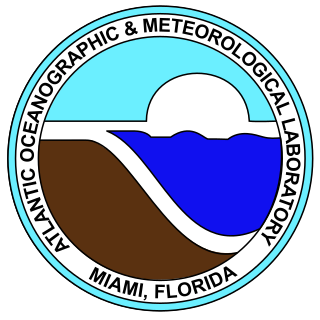
The Atlantic Oceanographic and Meteorological Laboratory (AOML), a federal research laboratory, is part of National Oceanic and Atmospheric Administration's (NOAA) Office of Oceanic and Atmospheric Research (OAR), located in Miami, Florida. AOML's research spans tropical cyclone and hurricanes, coastal ecosystems, oceans and human health, climate studies, global carbon systems, and ocean observations. It is one of seven NOAA Research Laboratories (RLs).
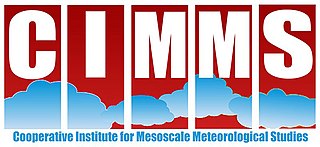
The Cooperative Institute for Mesoscale Meteorological Studies is a research organization created in 1978 by a cooperative agreement between the University of Oklahoma (OU) and the National Oceanic and Atmospheric Administration (NOAA). CIMMS promotes collaborative research between NOAA and OU scientists on problems of mutual interest to improve basic understanding of mesoscale meteorological phenomena, weather radar, and regional climate to help produce better forecasts and warnings that save lives and property. CIMMS research contributes to the NOAA mission through improvement of the observation, analysis, understanding, and prediction of weather elements and systems and climate anomalies ranging in size from cloud nuclei to multi-state areas.

The National Weather Center (NWC), on the campus of the University of Oklahoma, is a confederation of federal, state, and academic organizations that work together to better understand events that take place in Earth's atmosphere over a wide range of time and space scales. The NWC partners give equal attention to applying that understanding to the development of improved observation, analysis, assimilation, display, and prediction systems. The National Weather Center also has expertise in local and regional climate, numerical modeling, hydrology, and weather radar. Members of the NWC work with a wide range of federal, state, and local government agencies to help reduce loss of life and property to hazardous weather, ensure wise use of water resources, and enhance agricultural production. They also work with private sector partners to develop new applications of weather and regional climate information that provide competitive advantage in the marketplace.

The Cooperative Institute for Research in Environmental Sciences (CIRES) is a research institute that is sponsored jointly by the National Oceanic and Atmospheric Administration (NOAA) Office of Oceanic and Atmospheric Research (OAR) and the University of Colorado Boulder (CU). CIRES scientists study the Earth system, including the atmosphere, hydrosphere, cryosphere, biosphere, and geosphere, and communicate these findings to decision makers, the scientific community, and the public.

The US National Center for Atmospheric Research is a US federally funded research and development center (FFRDC) managed by the nonprofit University Corporation for Atmospheric Research (UCAR) and funded by the National Science Foundation (NSF). NCAR has multiple facilities, including the I. M. Pei-designed Mesa Laboratory headquarters in Boulder, Colorado. Studies include meteorology, climate science, atmospheric chemistry, solar-terrestrial interactions, environmental and societal impacts.

The Royal Dutch Meteorological Institute is the Dutch national weather forecasting service, which has its headquarters in De Bilt, in the province of Utrecht, Netherlands.

The Northern Gulf Institute (NGI) is a National Oceanic and Atmospheric Administration (NOAA) Cooperative Institute started in October 2006. It is one of 16 NOAA Cooperative Institutes (CIs). The NGI is a partnership of six academic institutions and NOAA. The collaboration led by Mississippi State University (MSU), includes the University of Southern Mississippi (USM), Louisiana State University (LSU), Florida State University (FSU), the University of Alabama in Huntsville, and the Dauphin Island Sea Lab (DISL). The NGI defines the Northern Gulf of Mexico region as the upland, watershed, coastal zone, and coastal ocean areas from the Sabine River in Louisiana east to the Suwannee River in Florida.

Jagadish Shukla is an Indian meteorologist and Distinguished University Professor at George Mason University in the United States.
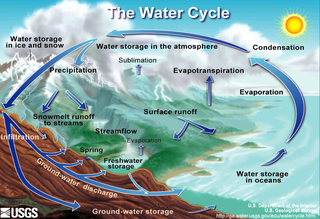
The Global Energy and Water cycle Exchanges project is an international research project and a core project of the World Climate Research Programme (WCRP).

The Tuvalu Meteorological Service (TMS) is the principal meteorological observatory of Tuvalu and is responsible for providing weather services to the islands of Tuvalu. A meteorological office was established on Funafuti at the time the islands of Tuvalu were administered as parts of the Gilbert and Ellice Islands colony of the United Kingdom. The meteorological office is now an agency of the government of Tuvalu.
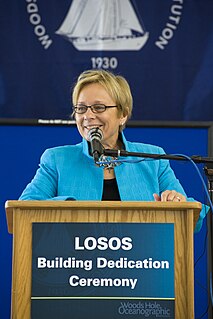
Susan K. Avery is an American atmospheric physicist and President Emerita of the Woods Hole Oceanographic Institution (WHOI) in Massachusetts, where she led the marine science and engineering research organization from 2008–2015. She was the ninth president and director and the first woman to hold the leadership role at WHOI. She is Professor Emerita at the University of Colorado, Boulder (UCB), where she served on the faculty from 1982–2008. While at UCB she also served in various administrative positions, including director of the Cooperative Institute for Research in Environmental Sciences (CIRES), a 550-member collaborative institute between UCB and the National Oceanic and Atmospheric Administration (NOAA) (1994-2004); and interim positions (2004-2007) as vice chancellor for research and dean of the graduate school, and provost and executive vice chancellor for academic affairs. Currently she is a senior fellow at the Consortium for Ocean Leadership in Washington, D.C.
References
- ↑ "Cooperative Institute for Climate Applications and Research (CICAR)" . Retrieved 2020-10-22.
| This climatology/meteorology–related article is a stub. You can help Wikipedia by expanding it. |